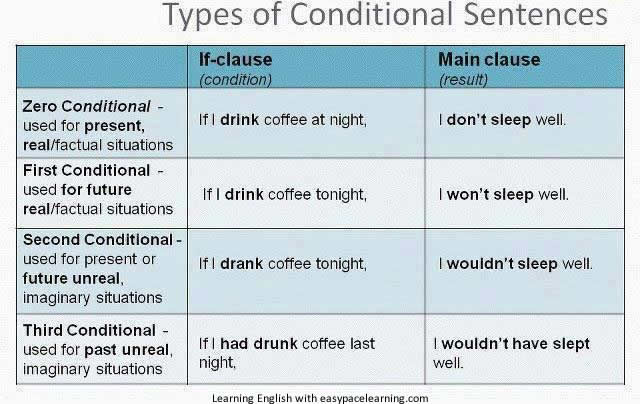4 types of conditional sentences English grammar
Learning about the 4 types of conditional sentences
Zero conditional
If + present simple, (then) + present simple
What does the zero conditional mean?
The condition is used when facts or things are always true; the time is not specific; if has the same meaning as when or whenever,
Examples of how to use the zero conditional
If students study hard, they will get good marks.
If you heat water to 100°C, it boils
When students study hard, they get good marks.
If you pour oil into water, it floats.
First Conditional
If + present simple, (then) + future tense with will or using the modal verbs may /can / might / should + infinitive
First conditional explained
Expresses a possible condition in the future with a reasonably likely result.
Examples of how to use the first conditional
If it rains tomorrow, the match will be cancelled.
If the students get a score of at least 90% on the exam, they will be eligible for an exemption.
If I feel sick, I will not go to school.
Second conditional
If + simple past, (then) + would/might/could + infinitive
What does second condition mean?
Is used for present or future for situations that are unreal or imaginary. It can be used to talk about a possible event in the future, but results are only remotely likely to happen and is often used to give advice.
Examples of how to use the second conditional
If he were a bird, he would fly across the harbour.
If I knew the student well enough, I would advise her not to take the exam in August.
If I had $200,000 now, I would buy a car.
Third Conditional
If + past perfect, (the) + would/could/might + have + past participle
What is the third conditional used for?
Is used for imaginary past situation and speculates what might have been. You use this conditional to express a past mistakes, past wishes or to apologise.
Examples of how to use the third conditional
If I had had enough money, I would have bought the camera yesterday.
If the students had studied harder, they could have passed the final exam.
If I had come home earlier, I would not have missed the program.

